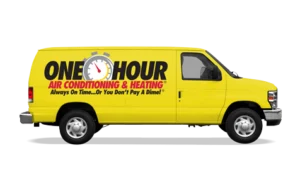8 Signs My AC Needs Repair This Spring?
Spring is finally here! The birds are chirping, flowers are blooming, and soon enough, we’ll all be reaching for that AC remote. But what happens when you flip the switch, and things don’t seem right? Trust me, I’ve been there, and it’s not how you want to start the warm season.
Let’s chat about the telltale signs that your air conditioner might need a little TLC before the real heat hits. After all, noticing these issues early could save you from sweating it out during the hottest days of summer (and save your wallet from an emergency repair bill).
Common Signs Your AC Needs Repair
1. Weak or No Airflow
Do you know that satisfying rush of cool air that should greet you when your AC kicks on? If it feels more like a gentle breeze or worse—nothing at all—something’s up. I remember standing in front of my vent last spring, desperately waving my hand around and thinking, “Where’s the air?”
This could be something simple like a clogged filter (when was the last time you changed yours?), or it might be a blocked duct or a blower motor that’s seen better days. Whatever the cause, weak airflow means your system is working overtime without delivering results. It’s like running a marathon in place—lots of effort, zero progress.
2. Warm Air Instead of Cool
There’s nothing quite as disappointing as expecting a blast of cool air and getting warm air instead. If your AC is blowing air that feels room temperature or even warm, it could be low on refrigerant, have a compressor issue, or your thermostat might be miscalibrated.
I once spent an entire afternoon adjusting my thermostat lower and lower, wondering why it felt like my AC was secretly a heater in disguise. Spoiler alert: it needed refrigerant.
3. Frequent Cycling
Your AC should run in fairly predictable cycles, not constantly turning on and off like it can’t make up its mind. This “short cycling” isn’t just annoying—it’s hard on your system and your energy bill.
Think of it like constantly starting and stopping your car in traffic. It uses more gas and wears out your engine faster than cruising at a steady speed. The same goes for your AC.
4. Strange Noises
A properly functioning AC shouldn’t sound like a rock band practicing in your utility closet. While some operational noise is normal, loud banging, grinding, or high-pitched squealing definitely isn’t.
My neighbor ignored a rattling sound for weeks until her compressor completely failed. Don’t be like my neighbor—those weird noises are your AC’s way of crying for help!
5. Unpleasant Odors
Does your house smell musty or like something’s burning when the AC runs? Neither is normal. Musty odors usually signal mold or mildew growth somewhere in the system, while burning smells could indicate electrical problems that need immediate attention.
Remember, your AC should cool your home, not make it smell like a forgotten gym bag or an electrical fire waiting to happen.
6. Higher Energy Bills
If your energy bill suddenly jumps and you haven’t changed your usage habits, your AC might be the culprit. An inefficient system has to work harder to cool your home, consuming more electricity in the process.
I once had a bill that was nearly double my usual amount. After getting my AC serviced, my next bill dropped back to normal. That repair practically paid for itself!
7. Leaks or Moisture Around the Unit
A little condensation is normal, but puddles around your AC unit aren’t. Water pooling could indicate a blocked drain tube, while oily spots might be refrigerant leaks both need professional attention.
Ignoring leaks can lead to water damage, mold growth, or in the case of refrigerant, a complete system failure. Plus, refrigerant leaks are harmful to the environment and potentially hazardous to your health.
8. Your AC is Blowing Humid Air
Your AC doesn’t just cool it dehumidifies too. If your home feels like a tropical rainforest even with the AC running, something’s off with its dehumidifying function.
Last summer, I could tell something was wrong when my glasses fogged up every time I came inside from the yard. Turns out, my AC needed a good cleaning to work properly again.
When to Call for Professional Help
I’m all for DIY projects, but some AC issues are best left to the pros.
You should probably pick up the phone if:
- Your home isn’t cooling properly despite the AC running
- That weird noise hasn’t stopped after a few minutes
- There’s a burning smell coming from the vents
- Your system is playing on-off-on-off like a broken record
- You’ve discovered water where it shouldn’t be
- Your energy bill is giving you heart palpitations
- The airflow has suddenly become weaker than a whisper
Ignoring these warning signs won’t make them go away. In fact, small problems tend to grow into bigger, more expensive ones if left unchecked. It’s like ignoring a small leak in your roof—eventually, you’ll be buying new furniture too.
What Happens During an AC Repair Service?
Wondering what actually happens when the pros arrive?
Here’s the rundown:
- Inspection and Diagnosis: They’ll listen to your concerns and check every component of your system.
- Filter Check: Often, a simple filter replacement can solve airflow issues.
- Refrigerant Assessment: They’ll check levels and look for leaks.
- Electrical Component Inspection: All wiring and connections will be tested.
- Cleaning: Dirty coils and condensers get a proper cleaning.
- Thermostat Calibration: They’ll make sure your thermostat is reading correctly.
- Blower and Fan Check: These components are crucial for proper airflow.
- Ductwork Inspection: Leaky ducts waste energy and reduce efficiency.
- Performance Testing: After repairs, they’ll run tests to ensure everything works properly.
Quick FAQs About AC Repairs
How often should I have my AC checked?
Aim for an annual tune-up in spring, before you really need it. Think of it as a yearly physical for your AC.
Can I repair my AC myself?
Some maintenance tasks like changing filters are DIY-friendly, but leave refrigerant issues and electrical repairs to the pros.
What happens if I ignore AC problems?
Small issues become big problems. That $100 repair could turn into a $1,000 replacement if neglected.
Is it better to repair or replace my AC?
If your unit is over 10-15 years old and needs frequent repairs, replacement might be the more economical choice long-term.
Get Your AC Ready for Spring
Don’t wait until the first 90-degree day to discover your AC isn’t up to the task. If you’re noticing any of these warning signs, it’s time to get your system checked out.
Remember, preventative maintenance is almost always cheaper than emergency repairs. Plus, there’s nothing worse than sweating it out while waiting for a repair during the busiest season for HVAC companies.

